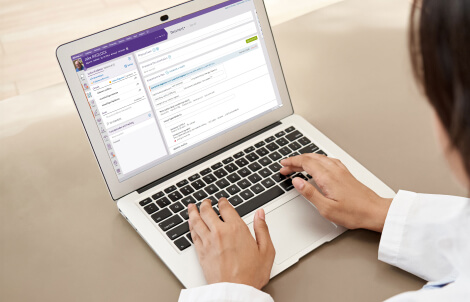Article
athenaClinicals, athenaCollector and athenaCommunicator … all in athenaOne
November 26, 2024

athenaCollector is still at the heart of our business model and core software capabilities. It is now complemented by a fully integrated electronic medical records function known as athenaClinicals® and a comprehensive suite of patient engagement tools and services, athenaCommunicator®. Together, these three capabilities are known as athenaOne®.
Rather than multiple software and systems patched together, or siloed integrations doctors maintain separately to get the functionality they need, athenaOne combines the core functions of a medical practice or clinic into a single connected suite of software and services to manage your healthcare organization from patient registration to reimbursement and reporting, and every step in between. athenaOne is a seamless integration of the three C’s of your business – the clinical diagnosis and documentation, the collection of balances and reimbursements, and the communication with patients and other providers.
If you’ve heard about our products from colleagues who are “on athena,” they may have talked about certain aspects of the integrated solution, athenaOne, by the individual names of these functionalities working together to handle the business of healthcare. At athenahealth, our mission is to cure complexity, so read on to learn what athenaClinicals, athenaCollector, athenaCommunicator, and athenaNet® are, and how they’re all part of athenaOne, a single solution for electronic health records, practice and revenue cycle management and patient engagement, all in, well, One.
What is athenaClinicals?
athenaClinicals is the name of the electronic medical records function of athenaOne, the cloud-based SaaS main product of athenahealth, Inc. We launched athenaClinicals in 2005 and this EHR platform capability is a core part of athenaOne, athenahealth’s award-winning unified HIT solution that also includes practice management, medical billing, and patient engagement capabilities in addition to the digital patient records. When you access a patient’s health history, add your SOAP notes during a patient encounter, review lab results or notes from another clinician, enter a diagnosis, or electronically send a prescription request, you’re using the athenaClinicals functionality of athenaOne.
athenaClinicals is the portion of athenahealth’s athenaOne software and services that handles electronic medical charting, prescription, lab and diagnostic test ordering, digital health records, clinical task management, telehealth virtual visits, and quality program support. You may also hear athenaClinicals referred to as athena EMR or athena EHR.
What is athenaCollector?
athenaCollector is the revenue cycle and practice management functionality and services that are a core part of athenaOne. athenaCollector was athenahealth’s first product – the cloud-based practice management software was introduced in 2000 and has helped more than 160,000 doctors and healthcare centers with medical billing, claims submissions, authorization and denials management, patient collections, and getting paid more of what they’re owed for the past quarter century.
As a fully integrated solution, there’s no need for doctors to open separate programs or worry about connectivity and interoperability between their EMR and practice management systems. When using athenaOne, information from the medical record pre-populates claims; then, more than 30,000 rules scrub those claims before electronically submitting them to payers for reimbursement, resulting in industry-leading claims accuracy, getting you paid faster with less rework. Your athenaCollector revenue cycle management functionality may also include additional services like medical coding and prior authorization management to help reduce the administrative burden on practices.
What is athenaCommunicator?
athenaOne also incorporates athenaCommunicator, the suite of patient engagement software and services introduced by athenahealth in 2008. The Communicator tools are part of the athenaOne unified solution, so providers and practice managers can use the same technology that holds patient records and their claims information to engage with patients about their upcoming appointments, care plans, and payments due.
athenaOne’s athenaCommunicator allows doctors, nurses, and medical assistants to communicate with patients using secure, HIPAA-compliant messages and gives patients access to portions of their EMR to view test results, upcoming appointments, and care plans through a user-friendly patient portal and a highly rated mobile app, athenaPatient®. It also enables self-registration, automated appointment reminders, and other tools such as convenient online payments, appointment check-in, prescription refill requests, and telehealth to help patients take an active role in their healthcare and improve outcomes.
athenaOne customers use athenaCommunicator to help empower patients to take an active role in their healthcare while reducing staff time spent on patient outreach thanks to automated messaging at scale. athenaCommunicator allows practices to delegate patient communication tasks to administrative staff, who have their own dashboard within athenaOne, and to outsource certain patient engagement tasks to athenahealth specialists, letting us take on more of the administrative work so physicians can focus on patient care.
Practices use athenaCommunicator’s patient engagement tools to reduce no-shows with patient-driven scheduling, outreach messaging, and prompts within the patient portal and the athenaPatient app, meeting patients where they are. Physicians and office staff can also access athenaCommunicator through the athenaOne mobile app interface to take care of priority or time-sensitive tasks while on the go, wherever you are.
What is athenaOne?
athenaOne is an all-in-one cloud-based healthcare software and embedded service model that includes three core functions: an electronic health record for digital patient medical records and interoperability with other providers, a medical billing and claims submission functionality to control your revenue cycle and manage your practice, and patient engagement tools that allow patients to view their information, communicate with providers, make appointments, and other functions.
athenaOne has tailored workflows for multiple specialties, including OB/GYN, primary care, orthopedics, and behavioral health. The core software suite can be customized with diverse templates that capture specialty-specific workflows to streamline your processes, help identify care gaps and reduce charting time – just ask your dedicated Customer Success Manager for help making athenaOne work best for your practice, clinic, or healthcare center’s daily needs.
athenaOne customers can further personalize their solution by selecting among a suite of enhanced services such as telehealth, voice-powered dictation, and Ambient Notes, a new feature that uses AI to reduce documentation time and improve the patient encounter.
In addition to the software capabilities, customers can amplify athenaOne with value-added services such as prior authorization management, claims denial management, and medical coding so that athenahealth takes on more of your administrative work and leaves clinicians more time to work directly with patients.
With open APIs and a robust slate of developers adding new features every month, providers can further customize athenaOne’s core functionality. There are more than 500 apps from the athenahealth marketplace that connect even more features to athenaOne, such as patient queueing, intake management and triage, chronic care or prescription refill management, and more. Many athenahealth Marketplace partners leverage generative AI functionality to extend existing AI capabilities for physicians and practices ready to take that step.
athenaOne is an EHR software, but so much more
Although athenaOne contains much more than EHR capabilities, it is often referred to as an EMR or EHR, since the backbone of every practice is patients.
- athenaOne includes the electronic health records capabilities, such as patient history, clinical documentation, and electronic ordering of tests, prescriptions and labs, that are known as athenaClinicals.
- athenaOne includes the practice management and revenue cycle management functions with athenaCollector, which also offers robust reporting and data insights from the athenaOne network so you can monitor and benchmark your practice’s performance.
- With athenaCommunicator, athenaOne also has patient engagement and communication tools, including the athenaPatient® mobile app, for a unified healthcare IT solution to take care of the administrative side of healthcare from start to finish.
athenaOne is a Certified Electronic Health Records technology (CEHRT), compliant with the meaningful use provisions of the MIPS program, needed for Medicare Part B providers to qualify for the Center for Medicare & Medicaid Services quality metrics.
Customers using athenaOne enjoy the robust and customizable reporting dashboard that allows practices to see how they are doing with metrics such as charge entry lag, percentage of balances collected, and population health data to help identify care gaps and improve patient outcomes. Practices can compare their performance against other practices on the athenaOne network to find opportunities to optimize their revenue cycle and patient scheduling, and leverage data to discover recommended high-value actions that improve the health of their patients.
Who uses athenaOne?
More than 160,000 providers in every US state use athenaOne as the healthcare IT backbone of their practice. Doctors, clinicians, and practice managers count on athenaOne to keep patient information safe, secure, and organized, their cashflow stable, and their regulatory reporting clean.
There are athenaOne users from every medical specialty from Behavioral Health to Women’s Health – and every specialty in between. Medical start-ups with a single doctor, small practices with a handful of physicians working together, mid-size medical groups of doctors and specialists across multiple offices serving a community, Urgent Care centers with one or dozens of locations, Federally Qualified Health Centers, Accountable Care Organizations, and large hospitals or enterprise health systems all use athenaOne to solve their day-to-day business challenges, improve health outcomes and manage their practices.
On the athenaOne network, there are practices using fee-for-service models, participating in quality programs such as MIPS and Meaningful Use, and succeeding with value-based care contracts. AI-powered insights from the athenahealth network and intuitive, streamlined workflows save athenaOne clinicians time and help improve patient and practice metrics every day.
What is athenaNet?
athenaNet is the former name of the athenahealth cloud-based software that housed athenaClinicals, athenaCollector and athenaCommunicator. The brand name athenaNet has been replaced by athenaOne. Many physicians and practice managers who have used athenahealth’s EHR, revenue cycle, practice management or patient communications software over the past quarter century often still refer to “logging on to athenaNet.” Put simply, athenaNet is athenaOne.
Going to the athenaNet provider portal login takes you directly to athenaOne. Just as athenaClinicals, athenaCollector and athenaCommunicator are now all athenaOne, so, too, is athenaNet also athenaOne. One name. One solution. One network. One mission: to create a thriving ecosystem that delivers accessible, high-quality, and sustainable healthcare for all.
Interested in learning more about athenaOne for your medical practice?
Now that you know more about the all-in-one, intuitive, and high-performing features of athenaOne, are you curious to see it in action? Schedule a meeting with one of our sales development representatives dedicated to your type of practice and see how a single solution that combines your clinical, collections, and communications functions with the power of data insights of a nationwide network of providers can improve your workflows, revenue cycle, program metrics and patient health outcomes today.







